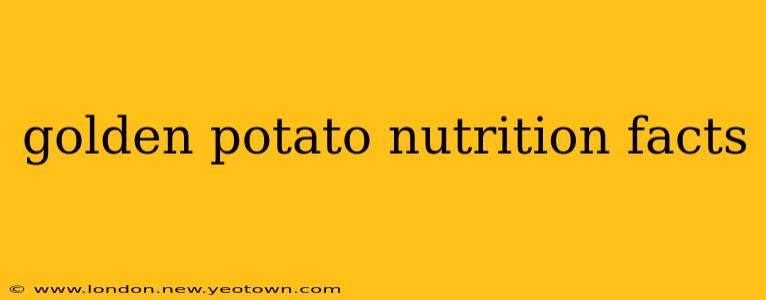The humble potato, a culinary staple across the globe, often gets a bad rap. But what about the vibrant, golden-hued variety? Let's unearth the nutritional secrets hidden within this sunny spud and discover why it deserves a place in a healthy diet. This isn't your average potato fact sheet; we'll explore the nuances of golden potato nutrition, addressing common questions and debunking some persistent myths.
What are the Nutritional Benefits of Golden Potatoes?
Golden potatoes boast a brighter nutritional profile than their russet cousins, thanks to their higher concentration of carotenoids – the pigments responsible for their sunny hue. These carotenoids are potent antioxidants, converting into Vitamin A within the body, crucial for maintaining healthy vision, skin, and immune function. But the benefits don't stop there. Golden potatoes are also a good source of:
- Vitamin C: A vital antioxidant that supports immune health and collagen production.
- Potassium: An essential mineral that helps regulate blood pressure.
- Fiber: Promotes digestive health and keeps you feeling full, aiding in weight management.
- Iron: Essential for carrying oxygen throughout the body.
- Magnesium: Plays a vital role in various bodily functions, including muscle and nerve function.
Are Golden Potatoes Healthier Than Russet Potatoes?
This is a question frequently asked, and the answer is nuanced. While golden potatoes contain more beta-carotene (a precursor to Vitamin A) and generally have a slightly higher vitamin C content than russet potatoes, the overall nutritional difference isn't dramatically vast. Both varieties offer essential nutrients. The "healthier" choice depends more on preparation methods than the specific potato type. Roasting or baking potatoes with their skins on preserves more nutrients than frying them.
How Many Calories Are in a Golden Potato?
The caloric content of a golden potato varies based on size and preparation. A medium-sized baked golden potato (approximately 5 ounces) contains roughly 110-160 calories. However, adding butter, sour cream, or cheese can significantly increase the calorie count. Being mindful of portion sizes and preparation methods is key to managing caloric intake.
Are Golden Potatoes Good for Weight Loss?
Potatoes, including golden potatoes, can be part of a healthy weight-loss diet. Their fiber content contributes to satiety, meaning you feel fuller for longer, which can help curb overeating. However, their carbohydrate content should be considered as part of your overall dietary plan. Choosing healthy cooking methods and portion control are crucial for weight management when incorporating potatoes into your meals.
What Are the Differences Between Golden Potatoes and Sweet Potatoes?
While both are orange-fleshed and nutrient-rich, golden potatoes and sweet potatoes belong to different botanical families. Sweet potatoes have a noticeably sweeter taste and a higher sugar content than golden potatoes. While both offer vitamins and antioxidants, sweet potatoes are generally richer in beta-carotene and Vitamin A, and are often higher in fiber. Golden potatoes, however, offer a good source of potassium and Vitamin C.
How Can I Incorporate Golden Potatoes into My Diet?
The culinary versatility of golden potatoes is remarkable! They're fantastic baked, roasted, mashed, or used in soups and stews. Try roasting them with herbs and spices for a delicious side dish, or adding them to a hearty chili for extra flavor and nutrition. Their subtly sweet flavor pairs well with many ingredients, making them a flexible addition to your meals.
In conclusion, the golden potato is a nutritional powerhouse often overlooked. By understanding its nutritional profile and incorporating it mindfully into your diet, you can enjoy its delicious flavor and reap the benefits of its many nutrients. Remember that healthy eating is about balance and variety, and the golden potato is a valuable addition to a well-rounded diet.

